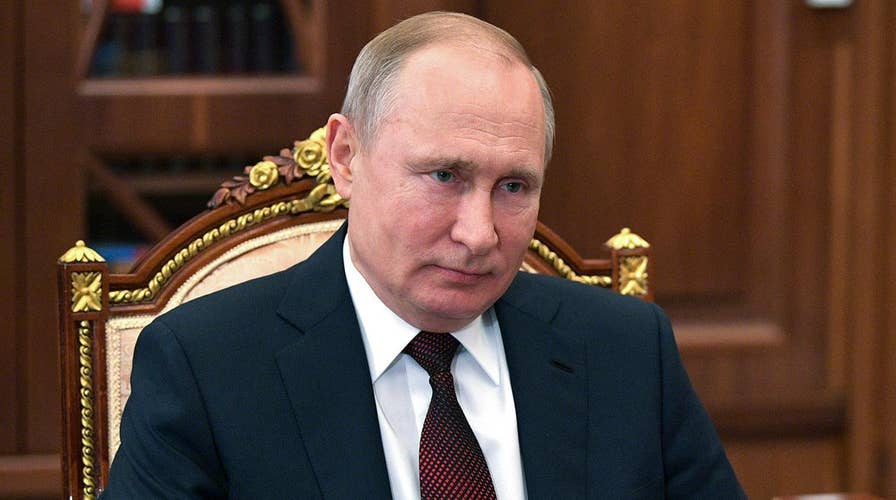Republicans turn their attention to the investigators that started the Russia probe
Lawmakers are demanding answers on the FISA warrants surrounding the Steele dossier. Fox News contributor Mollie Hemingway weighs in.
Robert Mueller was asked to investigate the charge that President Trump had colluded with the Russians. After a two-year, $25 million effort involving an overwhelmingly Democrat team of lawyers, Mueller concluded that there was no collusion between President Trump and Russia.
However, President Trump’s innocence does not mean the Russians are innocent.
There is a long history of Russian efforts to penetrate the United States, recruit spies, and plant agents of influence.
Diana West’s remarkable book, “American Betrayal,” outlines in detail a half-century of Soviet efforts to infiltrate the United States. She estimates that at its peak in the late 1940s there may have been as many as 500 Soviet agents working in America.
In the most famous example of Soviet penetration – and the American left’s refusal to believe in it – Alger Hiss was a very high State Department official and a Soviet agent. Hiss presided over the first United Nations Conference in San Francisco. When then-Congressman Richard Nixon charged that Hiss was a communist, the establishment rallied to Hiss’s defense. It seemed unthinkable that such an elegant member of the club could be a spy. Now (with access to Soviet documents) we know that while Hiss attended the Yalta Conference in 1945, he went to Stalin’s private railroad car at 2 a.m. to receive the highest civilian medal in the Soviet Union.
In more recent times, we had the case of Robert Hanssen – an FBI agent and long-time double agent. Hanssen spied for the Soviets and went to the Russians when the empire collapsed. At one point, Hanssen was assigned to find a suspected mole in the FBI (he had to find himself). He was saved by the 1994 discovery that Aldrich Ames, a very senior CIA analyst, had also been spying for the Soviets and the Russians. With Ames arrested, the FBI thought it had discovered the mole. Hanssen spied for seven more years until he was arrested in 2001.
My coauthor, Pete Earley, who helped write our new novel “Collusion,” had written two books about Americans who had spied against their own country. Then he helped a leading KGB defector write his memoir.
As we discussed the continuing challenge of collusion between Russia and Americans, we were also attracted to a second weird part of the Russian story.
More than any other country, Russia has a fascination with the development and use of poison. In the back of “Collusion,” we have six pages listing Russian uses of poison.
Not only do the Russians like developing and using poison, but they do it in a remarkably open and direct way. They want you to know they have poisoned someone. In 2006, they used Polonium-210 (a particularly nasty radioactive substance) to kill their own former spy, Alexander Litvinenko. They killed him in London, where it was obvious the poison would be identified, and it’s well-established that Russia is the only place that produces Polonium-210.
Putin and his government wanted people to know they had reached out to the heart of London to kill a defector. They were sending a signal to other potential defectors that they were risking their lives if they left Russia. Just last year, we saw another Russian effort to poison a defector in Britain.
Pete and I saw an opportunity to tell a story that would weave together American-Russian collusion with the Russian passion for poison.
Then we decided our hero should be a part of the modern world and face the kind of struggles that all too frequently make life difficult for veterans and wounded warriors.
Brett Garrett is a former Navy Seal who was severely injured in a helicopter crash during an operation against Boko Haram. To cope with the pain, he had been given the standard treatment – which included opioids. Like many people dealing with pain, he found himself addicted to the very drugs that had helped him through the injuries.
We wanted to show how even a strong person capable of succeeding as a Seal would find life vastly more difficult through an addiction that was not his fault.
Our hope is that “Collusion” will both entertain and educate. We want people to have a more realistic understanding of how dangerous Vladimir Putin’s Russia is. In addition to the poisonings and assassinations, Putin has been quoted as saying, “Russia never lost the Cold War… because it never ended.”
We also want people to have a deeper appreciation of how important it is to develop non-addictive pain control systems.
CLICK HERE TO GET THE FOX NEWS APP
I have launched a new, free podcast called “Newt’s World.” Last Sunday, we had experts on poison and the Russian approach. Next Sunday, we have two Army combat doctors who are developing non-addictive methods for treating pain. Both episodes are amazing.
I hope you find “Collusion” fascinating and informative.








































